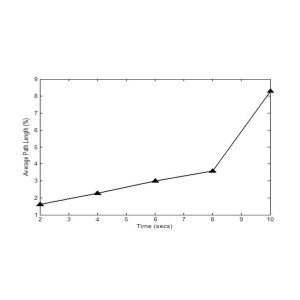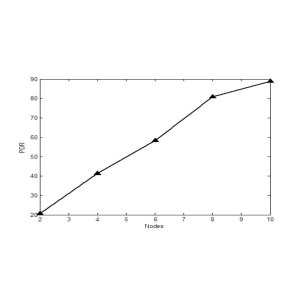Smart Energy Management and Route Optimization using Hybrid Algorithms for IoT in Wireless Sensor Networks
Problem Definition
The use of wireless sensor networks in Internet of Things (IoT) applications presents a critical challenge related to the efficiency and lifetime of these networks. Current protocols often result in energy-intensive communication processes that can drain the resources of the sensor nodes, leading to reduced network stability and performance. Additionally, the routing of data between node clusters is not optimized, which further exacerbates the issues related to network efficiency and longevity. The need for frequent data communication between nodes, cluster heads, and sinks adds another layer of complexity to the problem, as it increases the energy consumption and strain on the network as a whole. In light of these limitations and pain points, there is a clear necessity for research and development in this field to address these challenges and improve the overall functionality of wireless sensor networks in IoT applications.
The use of MATLAB software underscores the significance of computational tools in tackling these complex problems and finding innovative solutions for optimizing network performance.
Objective
The objective is to address the challenges faced in wireless sensor networks within IoT applications by improving network efficiency and lifespan through the implementation of new energy-efficient communication protocols and optimized data transmission paths. The goal is to enhance network stability and performance by utilizing a combination of algorithms for selecting cluster heads and establishing communication routes between clusters. This research aims to fill the existing gap in the field and provide insights into enhancing wireless sensor network performance within IoT applications.
Proposed Work
The proposed research aims to address the current challenges faced in wireless sensor networks within IoT applications by focusing on improving network efficiency and lifespan. By implementing a new energy-efficient communication protocol and optimizing data transmission paths within the network, the researchers hope to enhance network stability and performance. Utilizing a combination of Fuzzy, CminClusting, and KminClusting algorithms to select cluster heads, followed by the Yellow Saddle Godfish algorithm for further refinement, the researchers aim to create an optimized network structure. Additionally, utilizing the Pelican Optimization technique for establishing communication routes between clusters, the research team plans to improve energy management within the network, thus contributing to overall network longevity and efficiency. Through these approaches, the research aims to fill the existing research gap and provide valuable insights into enhancing wireless sensor network performance within IoT applications.
Application Area for Industry
This project's proposed solutions can be applied in various industrial sectors such as smart manufacturing, agriculture, healthcare, and logistics. In smart manufacturing, the improved efficiency and lifetime of wireless sensor networks can enhance production processes through real-time tracking of assets and monitoring of equipment conditions. In agriculture, the optimized routing and energy-efficient communication can enable precision agriculture practices by providing accurate data on soil conditions, weather, and crop health. In healthcare, the stable network can support remote patient monitoring and efficient communication between medical devices for timely patient care. Lastly, in logistics, the enhanced network stability and energy management can optimize supply chain operations by tracking inventory and monitoring transportation conditions in real-time.
Overall, implementing these solutions can address specific challenges faced by industries such as data communication reliability, energy consumption, and network stability while delivering benefits like improved efficiency, reduced downtime, and cost savings.
Application Area for Academics
The proposed project can greatly enrich academic research, education, and training in the field of wireless sensor networks and Internet of Things (IoT) applications. By developing energy-efficient protocols and optimized routing strategies, this research offers a novel approach to addressing the challenges faced by these networks.
Researchers can benefit from this project by understanding the methodologies and algorithms used for cluster head design, selection, and communication route establishment. They can explore the potential of using a hybrid of Fuzzy, CminClusting, and KminClusting algorithms for cluster optimization, as well as the Yellow Saddle Godfish algorithm for cluster head selection based on multiple parameters. Additionally, the Pelican Optimization technique for route establishment provides a new perspective on improving network efficiency and longevity.
MTech students and PhD scholars can leverage the code and literature of this project to further their research in the domain of wireless sensor networks and IoT applications. By studying the algorithms and methodologies proposed in this project, they can explore new possibilities for enhancing network performance and energy management. This project opens up avenues for conducting innovative research methods, simulations, and data analysis within educational settings.
The use of MATLAB software in this project enables researchers and students to implement and test the proposed algorithms in a practical manner. They can simulate the behavior of the network and analyze the results to understand the impact of the proposed methods on network performance and efficiency.
In terms of relevance and potential applications, the project focuses on improving the lifetime and efficiency of wireless sensor networks in IoT applications. The use of energy-efficient protocols and optimized routing strategies can have a significant impact on the stability and performance of these networks. Researchers, students, and educators can benefit from exploring these methods to advance their understanding of network design and optimization in IoT environments.
In conclusion, the proposed project offers valuable insights into enhancing network performance and energy management in wireless sensor networks. By exploring the algorithms and methodologies used in this research, academic researchers, MTech students, and PhD scholars can leverage the code and literature for their work and pursue innovative research methods in the field of IoT applications.
Future research can focus on further optimizing these algorithms and expanding their applications in real-world scenarios to address the evolving challenges in wireless sensor networks.
Algorithms Used
The project uses multiple algorithms: 1. Fuzzy and CminClusting algorithms for cluster head design. 2. KminClusting for optimized cluster creation. 3.
The Yellow Saddle Godfish algorithm for cluster head selection guided by multi-dependent parameters. 4. Pelican Optimization for establishing communication routes between clusters. The researchers aim to improve network performance and longevity by deploying energy-efficient routing protocols. The network design begins with the hybridization of Fuzzy, CminClusting, and KminClusting algorithms to design optimized clusters.
The Yellow Saddle Godfish algorithm is then used for cluster head selection based on various parameters. Communication between nodes is facilitated by establishing routes using the Pelican Optimization technique. These methods collectively enhance network life and improve energy management.
Keywords
SEO-optimized keywords: Wireless Sensor Network, IoT, Energy-Efficient Protocol, Routing Protocol, MATLAB, Fuzzy Algorithm, CminClusting, KminClusting, Yellow Saddle Godfish Algorithm, Pelican Optimization, Network Design, Cluster Head Design, Data Transmission, Network Lifetime, Energy Management, Communication Optimization, Node Clusters, Efficiency Enhancement, Stability Improvement, Data Communication, Internet of Things, Lifetime Enhancement, Hybrid Algorithms, Signal Quality, Distance Optimization, Cluster Optimization, Energy Conservation, Communication Efficiency.
SEO Tags
Wireless Sensor Network, IoT, Energy-Efficient Protocol, Routing Protocol, MATLAB, Fuzzy Algorithm, CminClusting, KminClusting, Yellow Saddle Godfish Algorithm, Pelican Optimization, Network Design, Cluster Head Design, Data Transmission, Network Lifetime, Research Investigation, PhD Research, MTech Project, Energy Management, Data Communication, Node Clusters, Internet of Things (IoT) Applications, Efficiency Optimization, Network Stability, Lifetime Improvement, Communication Protocol, Energy Efficiency, Cluster Head Selection, Hybrid Algorithms, Multi-Dependent Parameters, Signal Quality, Path Optimization, Efficiency Enhancement.
| Shipping Cost |
|
No reviews found!




















































No comments found for this product. Be the first to comment!